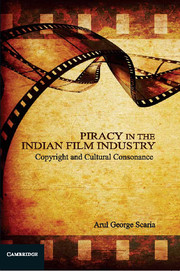Book contents
- Frontmatter
- Dedication
- Contents
- Preface
- Acknowledgments
- List of Abbreviations
- 1 Introduction
- 2 Piracy and the Indian Film Industry
- 3 Copyright Law in India: A Historical, Cultural and Legal Analysis
- 4 Copyright Piracy and Consumers: Insights from an Empirical Survey
- 5 In Search of Optimal Legal and Policy Options
- 6 Conclusion
- Appendix 1 Detailed Description of the Methodology Used in the Study
- Appendix 2 Questionnaire Used for the Empirical Survey
- Appendix 3 Tables
- Bibliography
- Index
6 - Conclusion
Published online by Cambridge University Press: 05 June 2014
- Frontmatter
- Dedication
- Contents
- Preface
- Acknowledgments
- List of Abbreviations
- 1 Introduction
- 2 Piracy and the Indian Film Industry
- 3 Copyright Law in India: A Historical, Cultural and Legal Analysis
- 4 Copyright Piracy and Consumers: Insights from an Empirical Survey
- 5 In Search of Optimal Legal and Policy Options
- 6 Conclusion
- Appendix 1 Detailed Description of the Methodology Used in the Study
- Appendix 2 Questionnaire Used for the Empirical Survey
- Appendix 3 Tables
- Bibliography
- Index
Summary
The suspension of a judge by the Supreme Court of Texas, pending the outcome of an inquiry, has recently made headlines across the world. The judge in question is facing inquiry over allegations of cruelly beating his then 16-year-old daughter with a belt 17 times, for illegally downloading music and games from the internet. Although the judge in the controversy has confirmed the beating, he argues that it happened when he lost his temper. One of the shocking aspects of the widely circulated video of this unfortunate incident is that this judge can be seen repeatedly using the word ‘stealing’ while beating his daughter and does not appear to think even for a moment why the teenager engaged herself in what he consider as ‘stealing’. Neither he appears to give consideration to the question as to whether the daughter shares his opinion that illegal downloading of music or games from internet is ‘stealing’ or even as something bad.
While the physical violence involved in the aforementioned unfortunate incident might have been an exceptional one, it reflects in many dimensions the contemporary global approach of fighting piracy in different countries. Panic-driven actions like awarding long imprisonments, imposing huge fines that by far exceed the payment capacity of an alleged offender and authorizing complete disconnection of users from internet at a time when access to internet has acquired more or less the characteristics of a basic human right are all in some manner reflections of the approach taken by the judge in the unfortunate incident.
- Type
- Chapter
- Information
- Piracy in the Indian Film IndustryCopyright and Cultural Consonance, pp. 209 - 218Publisher: Cambridge University PressPrint publication year: 2014

